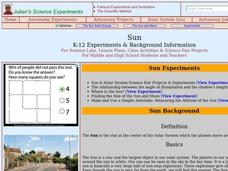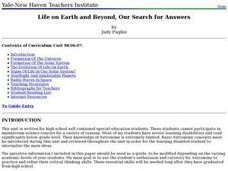Curated OER
Why is the Sky Blue?
Students explore diffusion or scattering of light. In this physics lesson plan, students explain why the sky is blue and sunsets/sunrises are red.
Curated OER
Asteroids
Young scholars examine the different types of asteroids and how they enter the atmosphere. In this space lesson students use mashed potatoes to create an asteroid they can eat.
Curated OER
Sun
Students study how the sun is at the center of the solar system. In this solar lesson students measure the altitude of the sun and its size.
Curated OER
Charge-Coupled Devices (CCDs)
Students explore CCDs or Charge-Coupled Devices. In this digital devices activity, students examine how CCDs are constructed, collect light, and create a digital signal.
Curated OER
The Milky Way and Beyond
Students consider the scale of the Milky Way Galaxy. In this Milky Way lesson, students hypothesize the length of time necessary to cross the Milky Way.
Curated OER
Cosmic Rays
Students study cosmic rays and the energy behind them. For this atmospheric lesson students complete a cosmic ray telescope project.
Curated OER
Sundials
Students investigate the different types of sundials and their history. In this shadows and time of day lesson students build their own sundials.
Curated OER
Star Light, Star Bright : Exploring How Stars Are Classified
Students work in small groups to organize stars into different categories. They consider size, luminosity, color and temperature, organize the groups and ten report their categories to the class.
Curated OER
Life on Earth and Beyond, Our Search for Answers
Students in a special education classroom are introduced to how the universe and solar system was formed. Using the internet, they research the characteristics of Earth that support human life. In groups, they compare and contrast...
Curated OER
World In Motion Curriculum
Students explore the night sky and its solar system. Using a Digitarium planetarium system, students observe four constellations. They discover the phases of the moon and eclipses. Students recognize the difference between normal and...
Curated OER
Sky Stories Curriculum
Students investigate the stories told by ancient cultures about the constellations. They listen to stories told by the Greeks and Romans. The classroom should have posters of constellations for the lesson and the teacher performs...
Curated OER
An Alphabet Journey Through Space
Third graders author a book about the universe to be shared with a younger audience. After compiling an alphabetic list of words related to the universe, 3rd graders research a definition for each word and put them in book form. Books...
Curated OER
Photometry
Young scholars examine blackbody radiation and light wavelengths. Students research the various types of electromagnetic spectrum. Young scholars examine any misconceptions they may have in light.
Curated OER
#22 Frames of Reference: The Basics
Students explore the concept of frames of reference in physics.
Curated OER
The Celestial Sphere
High schoolers are introduced to the celestial sphere, describing its apparent rotation and the special role of the pole star.
Curated OER
Newton's 3rd Law
Students examine how the formal definition of Newton's 3rd law: forces always originate in pairs, equal in magnitude and opposite in direction. They also examine how the informal, qualitative version: Each action has an equal and...
Curated OER
Motion in a Circle
Students explore uniform circular motion, and the relation of its frequency of N revolutions/sec with the peripheral velocity v and with the rotation period T. They examine how uniform circular motion is a type of accelerated motion.
Curated OER
Frames of Reference: The Basics
Students learn the concept of frames of reference in physics. They examine how two frames of reference, each moving with respect to the other with a constant velocity v (constant speed, constant direction).
Curated OER
Kepler's Second Law
Students explore orbital velocities and how they vary along each orbit, according to Kepler's Second Law.
Curated OER
Best of the Solar System
Students visit a site which provides images to be analyzed. Notes are taken and planets are named based on observed features and observations. Using peer review, they try to determine the identity of the planets. They are free to browse...
Curated OER
Day and Night
Students using experiments try to demonstrate how observations can be affected by the cycles of night and day.
Curated OER
Paint By The Numbers
Students, in groups, explore how astronomical spacecraft and computers create images of objects in space.
Curated OER
Please Ex-Planet
Seventh graders create a model of an earth centered solar system and a model of the sun centered solar system. As a class, they discuss why the earlier astronomers believed their model and why it changed when evidence arose that this...
Other popular searches
- Astronomy and Space Science
- Space Science Astronomy
- Science Astronomy Stars
- Earth Science Astronomy
- Science Astronomy Graphing
- Life Science Astronomy
- "Astronomy and Space Science























